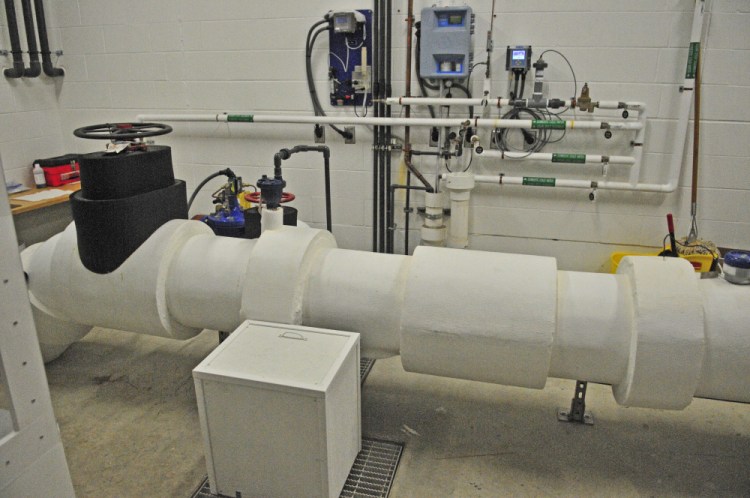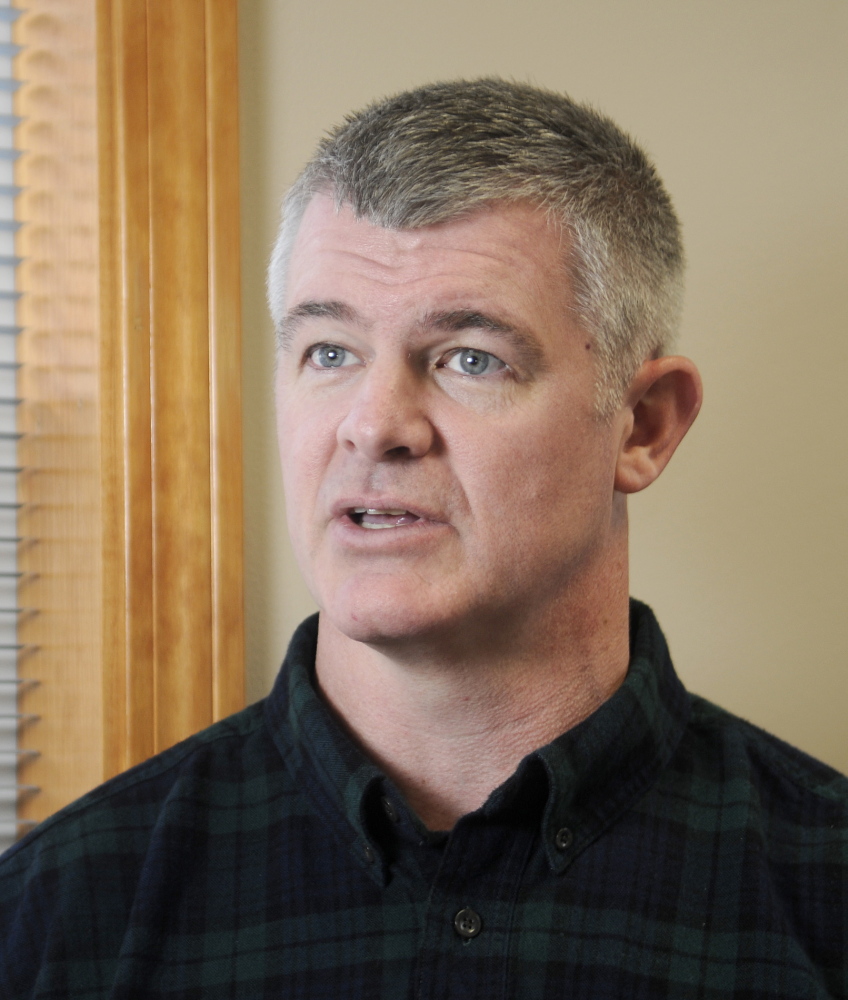AUGUSTA — Two new Greater Augusta Utility District wells on the east side of the Kennebec River are putting out “very hard” water, which can create problems for dishwashers and other appliances and heating equipment that use hot water.
While the public water supply in the city was already considered to be moderately hard, the water from two new wells, which started pumping water into the system last summer and providing water to utility district customers on the east side of the city, is even more so, according to Brian Tarbuck, superintendent of the district.
Officials stress that the hard water, which has higher levels of calcium carbonate in it due to the geology of the area, is not a threat to public health. But it can play havoc with commercial and, to a lesser extent, residential appliances and other equipment that uses hot water. Not only is hard water not dangerous to drink, the World Health Organization and studies have indicated trace amounts of minerals in water can be beneficial to human health.
“It’s absolutely not a public health concern. The water is safe to drink,” Tarbuck said. “It’s an aesthetic problem. But if you’re a homeowner and really aggravated by it, it may be more than an aesthetic problem. It might be a nuisance to some folks.”
Plumbers and other experts say hard water can leave calcium deposits with potential consequences ranging from white scaling left on dishwashers and coffee makers up to hot water tank failures and damage to boilers and other heating equipment.
“That calcium coats things and causes all kinds of issues for heating equipment,” said Sean McCormick, estimator for Augusta Fuel Company, which offers plumbing and water treatment services in the area. “It can cause havoc with dishwashers, clothes washers, they can fail, or leave you with a hefty repair bill. It’s not very pretty.”
Tarbuck said the district is working on a plan to gradually change the amount of chemicals it adds to water on the east side in an effort to lessen the impact of the hard water. But he warned that must be done carefully and deliberately. Extreme changes to the chemical composition of treated water could create a public health problem where there wasn’t one before if the chemical changes cause the water to release lead or copper from water pipes.
Such a change in water makeup was a factor in the serious water quality issues now gaining national attention in Flint, Michigan.
“It’s something you do slowly, because changing the water chemistry can have an impact,” Tarbuck said. “Flint is an extreme example of that. They changed the water quality and didn’t pay attention to the effect on the piping. We’ll run it by the state before we change anything. We want to make sure, in an effort to control something that is not a public health concern, we don’t end up creating a public health concern. We want the water to be aesthetically OK, but No. 1 is making sure it is safe to drink.”
Tarbuck said the district, which serves 5,700 customers on both sides of the river, will likely alter the chemicals it adds to water on the east side in about a month. Changes will take place slowly, and their impact will be measured before making further changes.
Anna Blodgett, a city councilor who lives on the east side, said late this summer she noticed her dishes were coming out of her dishwasher covered in a chalky white residue. At first she blamed the dishwasher, which she’d had for about a year, and called a repairman. He advised her hard water was the likely cause, and he suggested adding a product to the rinse receptacle of the dishwasher to clean the white substance off the dishwasher and dishes.
The first few of his recommendations, including lemon-lime Gatorade, didn’t work. But she said the fourth product she tried, OxiClean Triple Action Booster, which she got at a local supermarket, did the trick.
“I finally found a product that works OK, as long as you keep adding it in,” Blodgett said. “I wasn’t happy about it. But it’s much better. At least I don’t have to get a new dishwasher.”
Blodgett said she learned, after the issues with her dishwasher, the utility district had switched to a new water source, and the new water was harder than the old. She talked to Tarbuck about it and said district officials have been cooperative, and they acknowledged some people were having problems. She said she’s satisfied with the district’s plan to slowly change the chemical treatment to try to reduce the hardness of the water.
Meanwhile, there are things water users can do to minimize problems on their end, ranging from adding products to a dishwasher, as Blodgett did, to having water softener systems installed to treat the water and remove the calcium deposits before they enter appliances or water heaters.
McCormick said acid-based products such as CLR, available at hardware stores, or even white vinegar can help dissolve calcium off appliances. He warned not to mix any acid-based products with bleach, because that combination can create a toxic gas.
Tarbuck said the owner’s manuals of appliances may recommend ways to clean white scaling off of them.
Water softeners are a way to prevent the buildup of calcium from hard water on appliances and heating equipment in the first place.
Augusta Fuel Company sells softeners that use an ion exchange filtering process to remove calcium from hard water. McCormick said they cost around $2,000. They require annual maintenance and periodic refills of salt, which sell, depending on type, for between $5 and $30 for a 40-pound bag.
Lisa’s Restaurant, on Bangor Street, installed a water softener in 2011 at a cost of around $2,600 after noticing spots on items coming out of the dishwasher.
“There were spots on glasses and silverware, and coffee cups wouldn’t come clean, so we had to do hand-washing,” said Ashley Wardwell, manager of the east side restaurant. “We were pretty much forced to install (a water softener). It hasn’t been a problem since.”
Prior to this summer, the entire city was served by the west side wells. While the water from those wasn’t and isn’t as hard as the water from the new east side wells, it is moderately hard, Tarbuck said.
He said most restaurants on both sides of the river likely already use water softeners so they don’t have problems with their high-temperature commercial dishwashers.
Kennebec County officials discussed issues at the county jail they believe were caused by hard water at a commissioners’ meeting last week. They plan to spend about $2,000 to have a water softener installed to protect some $40,000 worth of new kitchen equipment that includes a dishwasher, steamer and kettle to protect them from hard water damage. The older equipment had scaling and other hard water related issues, according to Jason Stonier, maintenance supervisor for the jail.
County Commissioner Nancy Rines said the county should put the Greater Augusta Utility District “on notice,” and the district should acknowledge the financial burden the hard water was placing on the county.
Tarbuck said the VA Maine Healthcare System at Togus, which gets water from the district, needed to alter its water system because of the hard water. Togus officials could not be reached for comment.
The two new district wells started providing water to the east side of Augusta in July of last year.
The two new drilled wells on the east side of the Kennebec River at the end of Sunrise Circle in a gravel pit between the river and Riverside Drive tap into a different aquifer than the district’s older wells on the west side of the city.
They were added with a new water treatment plant as part of a $3.5 million project meant to provide alternative water sources, in part in case something were to happen to the west side wells.
Until 2004 the utility district got its water from Carleton Pond in Winthrop. However, the Carleton Pond treatment plant, built at a cost of $12 million, closed and was relegated to backup status in 2004 when district officials decided to draw water instead from the three west side wells, which were drilled in 1955 and 1965. Because of a cheaper treatment process for well water, water could be taken from the wells for about $500,000 less a year than from Carleton Pond.
However, after the change some customers reported having problems because of hard water, including white film on glasses and accumulation of white scaling on dishwashers and other appliances using hot water. Some customers, especially restaurants, have had to use water softening devices ever since.
Tarbuck said hard water is common in the midwestern part of the country but is relatively uncommon in Maine, other than in the Augusta area.
McCormick said in addition to Augusta, there also seems to be hard water in Gardiner and Hallowell.
Tarbuck said the district has gotten a small number of complaints about the issue from residential and commercial customers.
Keith Edwards — 621-5647
Twitter: @kedwardskj
Send questions/comments to the editors.






Success. Please wait for the page to reload. If the page does not reload within 5 seconds, please refresh the page.
Enter your email and password to access comments.
Hi, to comment on stories you must . This profile is in addition to your subscription and website login.
Already have a commenting profile? .
Invalid username/password.
Please check your email to confirm and complete your registration.
Only subscribers are eligible to post comments. Please subscribe or login first for digital access. Here’s why.
Use the form below to reset your password. When you've submitted your account email, we will send an email with a reset code.